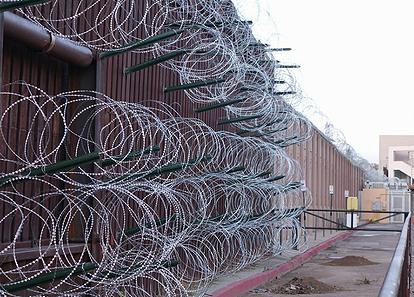
WASHINGTON, DC, May 12, 2020 (ENS) – Conservation groups today sued the Trump administration for taking $7.2 billion from the Department of Defense for border wall construction from the Pacific Ocean to the Rio Grande Valley without congressional approval. To date, Trump has taken more than $13 billion from the Department of Defense to build border walls.
The plaintiffs warn that the planned border wall projects will close off the remaining unfenced areas in California, Arizona, and New Mexico, including key corridors for threatened species such as jaguars, ocelots, and wolves.

The Center for Biological Diversity, Defenders of Wildlife, and the Animal Legal Defense Fund filed their lawsuit in U.S. District Court in Washington, DC.
In February 2019 the same groups sued the Trump administration over the president’s emergency declaration to pay for his border walls. Both lawsuits argue that the president violated the U.S. Constitution by overstepping his executive authority and sidestepping Congress to fund wall construction along the U.S.-Mexico border.
“These areas are home to some of the last remaining undisturbed habitat for wildlife and walling them off would push these species to the brink of extinction. Defenders will continue to fight for the protection of the rule of law against reckless decisions that put our communities and wildlife at risk,” said Jason Rylander, senior counsel for Defenders of Wildlife.
Today’s lawsuit challenges Trump’s fiscal 2020 transfer, which circumvents Congress’s rejection of his proposed border wall funding and renews his 2019 emergency declaration.
It also challenges six waivers that brush aside dozens of environmental and public health laws to fast-track wall construction in California, Arizona, New Mexico, and Texas.
“Trump’s assault on the U.S. Constitution has reached new heights as he turns the borderlands into sacrifice zones,” said Brian Segee, a senior attorney at the Center for Biological Diversity. “He’s done an end-run around Congress and completely overstepped his authority to declare a so-called emergency. Meanwhile, jaguars and other rare wildlife along the border are being pushed a step closer to extinction.”
In February the Trump administration announced 31 border wall projects totaling 177 miles using funds that Congress appropriated to the military for other purposes.
“Construction of a wall that cuts through the heart of vitally protected refuges, forests and conservation areas will have devastating effects on wildlife, such as jaguars, Mexican gray wolves, and ocelots,” warned Animal Legal Defense Fund Executive Director Stephen Wells.
“Using national emergency powers to fund construction of a border wall is illegal and misguided,” said Wells.
Also today, Chad Wolf, acting secretary of the Department of Homeland Security is visiting Nogales, Arizona for a tour of border wall construction in the area.

In response, U.S. Representative Raúl Grijalva, a Democrat whose district covers much of Arizona’s southern border, emphasized the state’s need for funding to fight the COVID-19 pandemic, not to build a border wall.
“Instead of focusing on the public health emergency raging across the country, the Trump administration remains hellbent on constructing the president’s useless vanity wall. This shameful publicity stunt is nothing more than a pathetic attempt to deflect from Trump’s failure to adequately address the COVID-19 pandemic and keep Americans safe,” said Grijalva.
“With Arizona testing capabilities lagging behind the rest of the nation and the number of cases increasing; Arizona is in need of more funding for hospitals, testing, and contact tracing capabilities. This is particularly concerning in small border communities where construction crews continue work on the wall with little regard to social distancing guidance,” Grijalva said.
“While Trump and Republicans resist calls for more money to address the pandemic, there seems to be endless amounts of money to construct the border wall—including a $569 million contract to a Trump donor,” he said.
“As the Trump administration is rumored to announce more waivers to further endanger the public health and well-being of border community residents, it’s important that we call it for what it is: a monument to Trump’s failed leadership, nonexistent morals, and his own ego.”
Grijalva is calling for the waivers to end, border wall construction to stop, and the administration to “start listening to the voices of border residents whose lives are impacted by his reckless policies.”
Arizona Republican senators and representatives have not commented on the conservation groups’ lawsuit or on Wolf’s visit. However in May 2019, according to a report in the Phoenix New Times newspaper, Representative Paul Gosar proposed an amendment to a defense spending bill authorizing the Secretary of the Army to task soldiers with building the border wall. His amendment was not passed into law.
Since Congress passed the National Emergencies Act in 1976, presidents have declared at least 58 states of emergency and dozens of them are still in effect.
But none of these laws that can be used to trigger use of the National Emergencies Act involve immigration or border wall construction. And none of them allow reallocation of previously appropriated funds to border wall construction.
The Center for Biological Diversity, Defenders of Wildlife, and the Animal Legal Defense Fund have also sued the Trump administration to challenge waivers that remove public health and safety laws to speed construction of border walls.
A petition asking the U.S. Supreme Court to review federal court rulings in those cases is pending.
Beyond jeopardizing wildlife, endangered species, and public lands, the plaintiff groups warn that the U.S.-Mexico border wall is “part of a larger strategy of ongoing border militarization that damages human rights, civil liberties, native lands, local businesses, and international relations. The border wall impedes the natural migrations of people and wildlife that are essential to healthy diversity.”
Copyright Environment News Service (ENS) 2020. All rights reserved.
© 2020, Environment News Service. All rights reserved. Content may be quoted only with proper attribution and a direct link to the original article. Full reproduction is prohibited.



